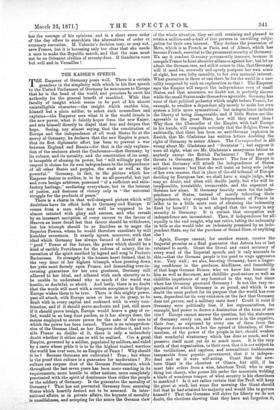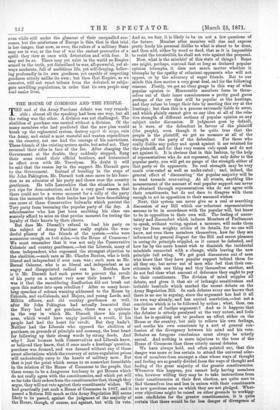THE KAISER'S SPEECH.
THE Emperor of Germany poses well. There is a certain grandeur in the simplicity with which in his first speech to the United Parliament of Germany he announces to Europe that he is the head of the world, and promises to exert his authority for the general benefit of mankind. With that faculty of insight which seems to be part of his almost unintelligible character—the insight which enables him, himself but a plain soldier, to select such counsellors and captains—the Emperor sees what it is the world dreads in the new power, what it faintly hopes from the new Kaiser, and sets himself directly to dispel that fear and deepen that hope. Seeing, nay almost saying, that the constitution of Europe and the independence of all weak States lie at the mercy of Germany, he declares that the new Empire is peace, that its first diplomatic effort has been to prevent a war between England and Russia—for that is the only explana- tion of the sentence about the Conference—that Germany, by its culture, and its morality, and the constitution of its army, is incapable of abusing its power, but " will willingly pay the respect it claims for its own independence to the independence of all other States and peoples, the weak as well as the powerful." Germany, in fact, in the picture which her Emperor desires to outline, is to be an all-powerful, but just and even benign arbitress, possessed "of a sufficient and satis- factory heritage," mediating everywhere, but in the interest of justice, and desirous of victory only in " the universal struggle for the products of peace."
There is a charm in that well-designed picture which will' doubtless have its effect both in Germany and Europe. It, comes from a man who may well be supposed to be almost satiated with glory and success, and who reveals by an incessant ascription of every success to the favour of Heaven an inner dread lest that favour should be withdrawn, lest his triumph should be so limitless as to anger the Superior Powers, whom he would therefore conciliate by still humbler reverences. It exactly agrees, moreover, with that ideal which Germany has always formed of herself as the " good " Power of the future, the power which should be a kind of earthly Providence for the redress of misery, the in- carnation of the spirit ascribed by legend and song to Frederic Barbarossa. So strangely is the human heart formed, that in the very hour of her highest triumph, when pressing down her yoke most fiercely upon France, and demanding ever-in- creasing guarantees for her own greatness, Germany still adhered to her ideal, and adhered with such sincerity as to be unable to understand why so much of the world was hostile, or doubtful, or afraid. And lastly, there is no doubt that the words will meet with a certain acceptance in Europe. Europe wishes them to be true. There is this mighty power, past all attack, with Europe more or less in its grasp, to be dealt with in every capital and reckoned with in every com- bination, and if it should prove moderate and just, still more if it should prove benign, Europe would heave a gasp of re- lief, would in no long time pardon, as it has always done, the means employed to secure power for the sake of the uses to which the power has been turned. There is no misapprehen- sion of the German ideal, as her Emperor defines it, and out- side France no dislike of it, there is only a melancholy doubt whether it either can or will be realized. Can a great Empire, governed by a soldier, populated by soldiers, and ruled by a caste whose pride it is to be the highest trained warriors the world has ever seen, be an Empire of Peace ? Why should it be ? Because Germans are cultivated ? True ; but where
is the proof that culture is a guarantee for moderation No culture can surpass that of the German Professorate, which throughout the last seven years has been more exacting in its requirements, more hostile to other nations, more completely penetrated with the spirit of dominance than either the people or the soldiery of Germany. Is the guarantee the morality of Germany ? That has not prevented Germany from annexing States which heartily desired not to be annexed. In inter- national affairs, as in private affairs, the keynote of morality _ is unselfishness, and accepting for the nonce the German view
of the whole situation, they are still retaining and pleased to retain a million-and-a-half of free persons in unwilling subju- gation for their own interest. They declare the possession of Metz, which is as French as Paris, and of Alsace, which has become French, essential to the permanent security of Germany. We say it renders Germany permanently insecure, because it compels France to hunt about for alliances against her; but let us admit the German case, and still it comes to this, that Germany will if need be, avowedly and openly postpone her own sense of right, her own lofty morality, to her own material interest. What guarantee is there or can there be for the world in a mo- rality tempered by such an explanation as that ? The Emperor says the Empire will respect the independence even of small States, and that assurance, we doubt not, is perfectly sincere while the small States make themselves agreeable. Germany has none of that political pedantry which might induce France, for example, to swallow a dependent ally merely to make her own system a little more symmetrical ; but independence includes the liberty of being disagreeable, and if little States are dis- agreeable to the great State, how will they stand then ? Why then the Chancellor of the Empire, with half Europe in his hands, will complain seriously that the Belgian Press is unfriendly, that there has been an anti-German explosion in Zurich, that Mr. Gladstone has written letters doubting the right of Germany to annex Alsace. The Correspondent is alb wrong about Mr. Gladstone and " Scrutator " ; but suppose it were all right, what are Mr. Gladstone's anonymous letters to anybody except the British Parliament ? They are not threats to Germany, Heaven knows ! The fear of Europe is not that Germany will attack the independence of States without a reason ; but that she will insist on being sole judge of her own reasons, that in place of the old tribunal of Europe deciding by European law, we shall have a single judge, who may no doubt, and often will, decide justly, but who will be irresponsible, irresistible, irremovable, and the exponent of German law alone. If Germany heartily cares for the inde- pendence of States, instead of merely tolerating their independence, why suspend the independence of France in order to be a little more sure of obtaining the indemnity, fixed by herself ? It is not alleged that the money is any security to Germany. It is certain that occupation and independence are inconsistent. Then, if independence for all, equally is the end sought, why not retire, taking the indemnity in bills as she would take an indemnity promised by an inde- pendent State, say for the purchase of Sound Dues, or anything else ?
Again, Europe cannot, for another reason, receive the Imperial promise as a final guarantee that Astrwa has at last returned to earth. Grant the literal and exact accuracy of every word of the Imperial speech, and it only amounts to this,—that the German people is too good to wage aggressive war. Very well ; we also, knowing Germany, have a linger- ing confidence in the goodness, kindliness, and immobility of that huge German Demos, who we know has humour in, him as well as fierceness, and childlike good-nature as well as• childlike impatience of any footstool in the way, but since when has Germany governed Germany ? Is not the very or- ganization of which Germany is so proud, and which is no doubt the most perfect for its purpose that the world has ever seen, dependent for its very existence on the fact that Germany does not govern, and a military caste does ? Could it exist if Germany were politically free, if her representatives, for example, had power to decree a diminution of the term of ser- vice ? Europe cannot answer the question, but the statesmen
of Germany surely can, and their answer is in the negative, their fear, as expressed by every one of them from the Emperor downwards, is lest the spread of liberalism, of Ger-
manism, of the power of the people in fact, should weaken that wonderful stratocracy which has done so much, and to
preserve itself must yet do so much more. It is the very
merit of that organization, in their eyes, that it is not subject to the vacillations, and caprices, and intermittent feeblenesses inseparable from popular government, that it is indepen-
dent and as it were self-acting. Grant that the new-
born Giant is the cheeriest of Giants, but still, if he must take orders from a wise, laborious Troll, who is any- thing but cheery, who passes life under the mountain welding
a blade of wondrous temper, of what security is his cheeriness to mankind ? Is it not rather certain that the Troll will keep
the giant at work, lest some fine morning the Giant should. feel that he had attained his majority and would like to govern himself ? That the Germans will strive for liberty we do not doubt, the elections showing that they have not forgotten it,
even while still under the glamour of their unequalled suc- cesses, but the misfortune of Europe is this, that in that trial is her danger, that now, as ever, the rulers of a military State may see in war, or the fear of war the easiest preventive of a spirit they view at once with detestation and with fear. It may not be so. There may yet exist in the world an Empire armed to the teeth, yet disinclined to war, all-powerful, yet al- ways moderate, full of ambitious life, yet self-denying, believ- ing profoundly in its own goodness, yet capable of respecting goodness utterly unlike its own ; but then that Empire, as we conceive, will not exact tribute from the defeated, or subju- gate unwilling populations, in order that its own people may lead easier lives.



































 Previous page
Previous page